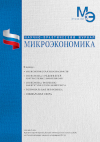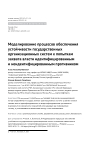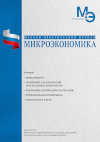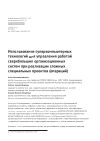Key trends in the development of artificial intelligence in the global economy
DOI: 10.33917/mic-4.123.2025.5-18
The article considers key factors determining the development of artificial intelligence in the global economy, including the likelihood of artificial intelligence dominance over humanity in the future, key aspects of artificial intelligence development with an emphasis on neural networks, possible prospects for the development of artificial intelligence until 2070, prospects for possible existential risks of artificial intelligence, as well as the risks of a cyber conflict. To study the problem, a dialogue with artificial intelligence was used – with the ChatGPT neural network from OpenAi. It is concluded that the future of artificial intelligence development in the global economy remains uncertain and depends on many factors, including technological advances and social changes. An unsolved problem is the establishment of a harmonious regulatory mechanism for relations between humans and artificial intelligence, taking into account its intensive development and implementation in various control systems of the global economy. Important tasks for humanity are to create ethical standards for the use of artificial intelligence and develop effective strategies for managing these technologies in order to minimize risks and maximize benefits from their implementation.
References:
1. Ageev A.I., Grigoriev V.V., Loginov E.L. Quantum simulators as a tool for observability of a digital supersystem with a significant component of unpredictable behavior of its elements. Microeconomics. 2024;5:5-13.
2. Ageev A.I., Ivanova O.D., Loshchinin A.A. Technology of information space of data and improvement of public administration. Economic strategies. 2023;25(6 (192)):62-67.
3. Ageev A.I., Zolotareva O.A., Zolotarev V.A. Russia in the global world of artificial intelligence: assessment by world rankings. Economic strategies. 2022;24(2 (182)):20-31.
4. Loginov E.L. Interception of control of complex organizational systems in the context of blurring boundaries between physical, cognitive and digital spaces of activity and control environments. Economy: Theory and Practice, 2024;1(73):3-10.
5. Bahtizin A.R., Soldatov A.I. Using artificial intelligence to optimize intermodal networking of organizational agents within the digital economy. Journal of Physics: Conference Series, 2019, 12042.
6. Grabchak E.P. Ensuring observability and controllability of complex technical systems in difficult and irregular situations when commands with a large distortion component are received. Lecture Notes in Electrical Engineering, 2021, Vol. 729 LNEE, pp. 624-631.
7. Grigoriev V.V., Balandin V.S., Shkuta A.A., Boyko P.A. The use of electronic semantization of the cognitive activity manifestations with the aim of detection of intentions of the group of people leading to the destabilization of the digital super system. IOP Conference Series: Materials Science and Engineering. 1. «1st International Conference on Innovative Informational and Engineering Technologies», 2020, IIET 2020, 012002.















